Jim and I realized pretty early in the process of searching for a new
5th-wheel camper that no matter how much research we did now or in the future,
we are never going to find the
perfect recreational vehicle (RV).
Why? Not because we're too picky. We're picky, but not that
picky.
No, it's because even the most expensive and well-built RVs -- whether
they are half-million dollar Monaco motorhomes or
top-of-the-line $150,000 5th-wheels
-- are going to have some construction
defects, warranty issues, and/or recalls at some point. RVs that aren't
warranted for full-time use are bound to have even more problems if they
are used very much.
RVs are a strange hybrid between a mobile home (that ends up pretty
stationary) and a passenger vehicle
but most RVs, especially the towable ones, aren't built with as sturdy materials and construction methods as
mobile homes, cars, trucks, and vans.
It's a wonder RVs last as long as they do, all things considered.
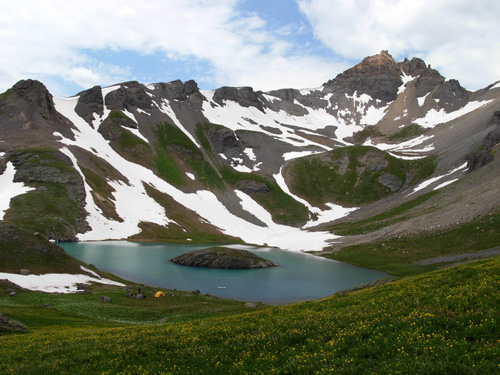
Ice Lake, San Juan Mountains near Silverton,
Colorado
In this entry I'm going to share some of my tips on purchasing as perfect (for
you) an RV as you can find. Some of these ideas are generic enough to be useful
when you're purchasing a passenger vehicle, mobile home, modular house, or stick-built house, too.
My tips are by no means exhaustive. There are entire books and DVDs devoted to
this topic. If you're in the market for a new RV, it'd be a good idea to read
as much as you can find at the library, bookstore, or online before signing on
the dotted line. I've got a lot of relevant personal experience but I don't
claim to be an expert. Quite the contrary.
It's a jungle out there and you'd better be well-armed with information and a
sound plan. That's why I call these my "rules of engagement."
Note: the photos in this entry are from a few of our RV travel destinations
the past seven years.
RULE #2: Know thyself
Whether you're a first-time RV buyer or a tenth-time RV buyer, you need to
determine what your intentions are before you can logically determine what type
of RV is best for you. There are as many kinds of "camping" and traveling in an
RV as there are people.
You might be perfectly happy heading for the nearest lake in a little truck
camper or pop-up tent trailer six weekends each summer and never touch the rig
the rest of the year. Your running buddy might want a compact Class B to travel
overnight to races a couple times a month and park at trailheads while hiking
the Colorado Trail:
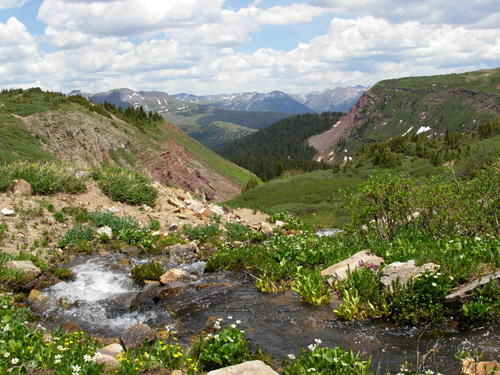
Tumbling stream and spring wildflowers along
Seg. 25 of the Colorado Trail in the San Juan Mountains
Your best friend might want a travel trailer or 5th-wheel
"toy hauler" to take his 4WD vehicles to a national forest three states away
for a two-week vacation in the fall.
Your co-worker might want a lightweight travel trailer to take her
family to Alaska for a
month.
Your retired neighbors might want a
mid-sized Class C motorhome to travel around the country several times a year to see the kids and grandkids. Your
parents might want a comfortable, high-end 5th-wheel or Class A motorhome to
live in full-time after selling their house.
Different strokes, and all that.
Ask yourself lots and lots of questions like these:
- How often will I use this vehicle? how far will I be driving or
towing it? for how long at a time? for how many years? If you really
enjoy it, you may be spending more time in the RV than you originally
planned. The reverse is also true.
- Where do I want to camp? in town? in the woods? desert? high
mountains? what are the roads like to get there? paved and smooth?
rough and narrow with low-hanging branches?
- What type of campsites do I want? dry camping (boon-docking) on
remote public lands with no hookups? public or private campgrounds with some
or full hookups? a five-star RV resort?
- How much work am I willing to do to set up the RV at a campsite
and get it ready to leave again? Towable vehicles usually take more
time to hitch/unhitch than motorhomes, unless you're towing a vehicle
behind your motorhome.
- How many amenities do I need when I'm camping? can I rough it or
do I need more comfort features? can I use the primitive toilet in a
national forest campground (or dig a hole in the woods!) or do I need
the privacy and cleanliness of my own RV bathroom? how much grey and
black water will my RV tanks hold before they must be emptied
(assuming you don't have a sewer hookup)? how much fresh water do I
want to carry in the rig?
how much kitchen counter space do I need? do I even need a
kitchen, or will I be grilling meals outside?
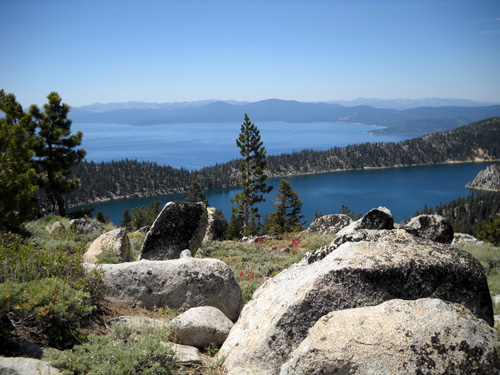
Lake Tahoe and another alpine lake, Nevada
- How much space do I need inside? can I climb a ladder and sleep on
a thin mattress over the cab of the RV or do I need a "real" mattress,
preferably king-sized, in a separate bedroom in the RV? how many
people will be in the RV with me? is there room for all of them to
sleep or will we need a tent outside? does this RV have enough room
inside for everyone who will be with me if it rains three days in a
row??
- How long an RV can I safely handle on the freeway, in my
neighborhood, in gas stations, and in campgrounds? Would it be easier
for me to back up a motorhome or a towable camper?
- What can I reasonably afford?
You get the drift. Ask yourself as many questions as you can think of before
deciding which category of RV fits your needs, how big it should be, and which
features are important to you.
RULE #3: Try some RVs on for size
The next logical step is to figure out which categories of RV are suitable for
the type of travel and camping you plan to do.
There may be several. In Jim's
and my case, we could reasonably live in a travel trailer, 5th-wheel, or Class
C or A motorhome on a full-time basis. We had already decided a 5th-wheel gives
us the most space and other features for the money. Even so, we still had a
long way to go before zeroing in on the particular coach we bought.
Based on your previous experience with RVs and your
particular needs, you might already know exactly which category is best for
you.
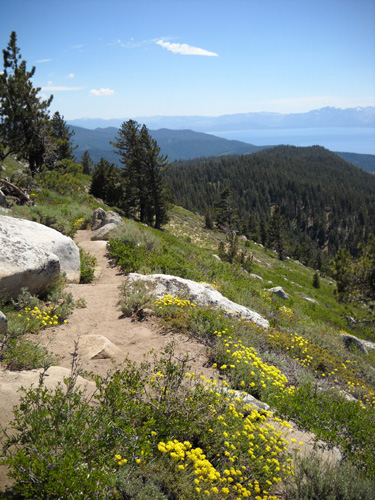
Colorful flowers above Lake Tahoe, Nevada
If not, there are several ways to narrow down the possibilities, including reading
relevant articles, books, and DVDs, talking to people who have these types of
campers, going on a weekend trip with a relative or friend who has the type of RV
you're considering, renting one or more RVs for a few days to see what they are
like before buying one, and starting to look at various brands and models at
dealers' lots.
Trust me: the more you know about RVs before you set foot on a dealer's lot,
the better!! Go with an open mind, however, because you might learn a lot. It
was a helpful salesman who told us that only two companies warrant their
5th-wheels for full-time use -- and it changed the focus of our search.
If you want either a new type of RV for you or one that is significantly longer
than one you've had previously, it's a great idea to somehow practice driving
it or a comparable RV before you complete your purchase so you can see how it
handles and where it will go.
We know a guy who bought a large, expensive pickup and the longest 5th-wheel
available, then discovered it was much too big to park in the typically short,
narrow sites in the state parks he wanted to visit with his family. He also
learned the hard way that his teenagers and wife weren't anywhere near
as enthusiastic as he was about camping and he had trouble storing the rig on
his property. He ended up selling it at a big loss in less than a year and gave
up his dream, at least until the kids are gone.
RULE #4: Prices are all over the board
There is a wide range of prices in every RV category, depending on size,
construction, and features. For example, you can spend as much or more money on
a high-end travel trailer or 5th-wheel as a motorhome. And that travel trailer
or 5th-wheel needs a hefty tow vehicle, too!
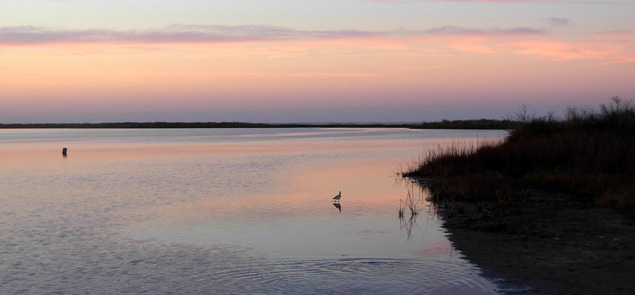
Soft sunset over Galveston Island, Texas
Don't think that just because you have only a certain amount of money to spend
on an RV that you can't choose from a particular category. Do your homework and
maybe you'll find a less expensive but equally suitable rig in what you
previously considered a too-pricey category.
RULE #5:
Do diligent research
The trick to finding as perfect an RV as possible and minimizing
the risk of problems with it later on is to do a whole pile of research
about manufacturers whose
products you're considering buying and how they are constructed.
How do you do that?
- diligent online research of the various companies: how long they've
been producing the type of RV you want, how strong they are
financially (e.g., are they about to file for bankruptcy and unlikely
to be around when you need warranty work done?), what owners of
those vehicles have to say after purchasing them (there are lots of RV forums
and e-lists similar to the ultra running list I talk about), and
other sorts of ferreting out information that consumers can do nowadays on the internet.
- finding one or more neutral guides that rate RV companies. This is
a lot harder than going to Consumer Reports to compare
passenger vehicles! One comprehensive source we found was Eaton's
2008-2010 RV Comparison
Guide, which rates 64
manufacturers and includes buying tips. We can't vouch for the
entirety of this guide because we've seen only the ratings, but it's
an example of the type of information that's available. (Carriage,
Inc. is at the top of that one.)
- checking the resale value of the brands and models you're
considering (best sources are NADA online or in print, Kelley Blue
Book in print). Just like passenger vehicles, some brands and models
of RVs hold their value better than others over time.
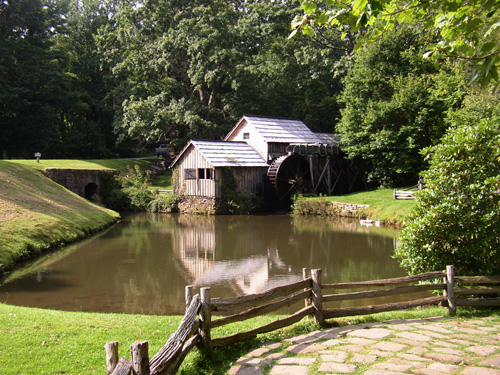
Mabry Mill, along the
Blue Ridge Parkway in southern Virginia
-
further research about the myriad of features offered and
construction materials and methods used: e.g., what are the pros and
cons of various types of frames? roofs? windows? suspension and other
mechanical systems? refrigerators? etc.
- talking with owners of the types of RV you're considering:
how happy are they with their rig? what problems have they had? how
well were they resolved? would they purchase the same make or model again?
(If you're lucky, they might invite you inside to show you their RV
but don't expect that favor; it's very risky to invite a
stranger inside.)
- thorough inspection of the construction of any RV you're seriously
considering buying, as thorough as if you were purchasing a
sticks-and-bricks house. Look at the caulking wherever you can see it
inside and outside the rig. Open doors, drawers, and windows. Ask how
things work, especially features that are new to you. Jim even crawled under some of them to check
the undercarriages. Good thing, because he found some loose and
missing screws attaching the polyester undercover to the coach we
bought and the dealer was able to fix it before we took it from the
lot.
RULE #6: Beware of first impressions
It's very tempting to fall in love with the superficial features of a new RV
when you're traipsing from dealer to dealer.
Manufacturers try to make their RVs look as inviting as possible at first
glance, sometimes covering up shoddy materials and construction. Dealers
compound the problem by staging their rigs with the dining table attractively set
with fresh flowers, placemats, and china (as if that's practical in an RV!), a popular
magazine on the sofa, and fancy soap in the bathroom.
It's a page right out of the housing market. All that's missing is the scent of
cookies baking in the oven.

White Sands National Monument, New Mexico
Before we discovered the DRV and
Carriage brands we were smitten by some of the layouts and
appealing decor of lower-quality rigs. Those are fine for people who use them
only a few weekends or weeks of the year but they aren't going to last for
several years of heavy or full-time use. We learned that with the HitchHiker. Some of the 5th-wheels
we looked at cost as much or more than those built
for full-time use -- but no way will they last as long.
The same is true for every category of RV. There is a wide range of quality and
price and they don't always follow a parallel track.
Unless you have an unlimited budget, you may have to prioritize your needs and wants.
What is important to you? Do you really
need plush furniture, gold-plated faucets, and a second kitchen -- or a rig
with less glitz that's
truly designed to last a longer time?
You can get high-quality construction and nice comfort and convenient
features in the same rig but we recommend you start first with the way the camper is built and
not how pretty it is inside. Even if
you aren't going to give it heavy use, you'll reap the benefits every time you
use it and retain a higher resale value when you eventually want to sell it.
RULE #7: There is no perfect floor plan
In addition to the fact that there is no perfect RV (all of them
will eventually have problems), it's also
nearly impossible to find the perfect floor plan. Just as with a
"grounded" house, buyers usually have to make some concessions if
the kitchen or bathroom, e.g., isn't exactly what they want. In
fact, there is even less choice in the RV industry than with
stationary houses.
And because of the current recession and the fact that it's the
off-season for buying RVs, there are even fewer RV choices
available. That definitely made our search more difficult this winter.
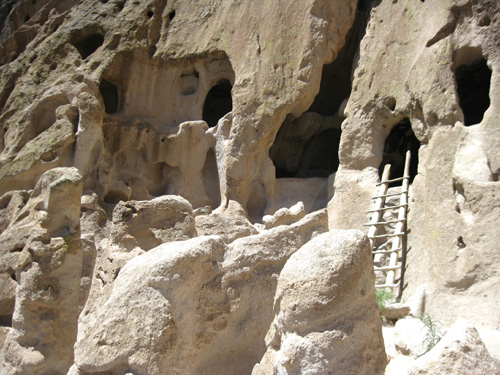
Bandelier National Monument, New Mexico
However, it's one of those "glass half-full" situations:
Jim and I saw those limiting factors as advantages to
buying an RV now. The independent RV newsletters and websites that
we read all sound more optimistic about a spring recovery for
the RV industry than similar information we read and hear about
the housing market. One of the big reasons we decided to
intensify our search for a new RV this winter was an effort to
get a better deal than we'd find if we waited until spring or
summer when demand traditionally picks up. We figured the dealers would be
more "hungry" for a sale in the dead of winter.
As frugal as we are, getting a better deal became more important
to us than having more choices when manufacturers begin producing a
wider variety of campers. We think we made the right decision to
buy now.
RULE #8: Length and weight: size matters
It's pretty obvious that the length of any RV you are
considering has implications
regarding fuel mileage, where you can store it, and where you can camp in it.
For example, our 34-foot HitchHiker wouldn't fit into some short
and/or narrow public park sites. We nearly always made inquiries
about the size of campsites before making reservations or
driving out of our way to a campground. The smaller the RV, the
more options you have for campsites. Our AT Adventure Run would have been cheaper and considerably less
complicated if Jim could have parked a smaller rig at or closer
to the trailheads when he crewed for me.
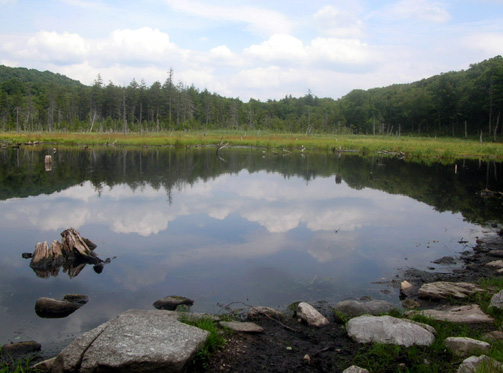
Pond along the AT in Vermont
Equally important but less obvious to some buyers is the weight of a 5th-wheel, travel
trailer, or pop-up camper if it will be towed by a truck, SUV,
or van you already have. It's not so important if you're buying
both the tow vehicle and camper at the same time but in either
case you MUST determine the maximum weight you can safely haul
with that vehicle.
Not only is this a critical safety issue for you and everyone
around you on the road, it's an issue that will also affect the
life of the tow vehicle.
Unfortunately, it's not real easy to determine the safe towing
limit because there is conflicting and confusing information
about dry axle weight, hitch weight, total dry weight, gross
vehicle weight rating (GVRW), maximum loaded trailer weight,
etc., etc.
In addition to that,
RV dealers are notorious for failing to advise buyers if the
trailers they want to buy weigh too much for the tow vehicle
they have. Most of them just want to sell you an RV and despite
what they say about helping you find the "right camper for you,"
their highest priority is making as big of a sale as they can.
Period.
It's a definite example of "buyer beware." It's your
responsibility to know how much weight your tow vehicle can
haul. Even if the dealer says, "Oh, sure, your truck is built to
haul more than that!" you still need to independently
verify that.

The AT along Franconia Ridge, New Hampshire
No one -- NO ONE -- at any dealer has ever asked about our truck to determine if
we could safely tow the RVs we were looking at!! And we've
been to a lot of dealers over the last two years. This is an
interesting
article by an RV expert and
former dealer about the phenomenon.
We had to figure it out on our own when we bought our Ram
truck last year and thereafter when we were looking at new
5th-wheels. We knew the Ram would tow the HitchHiker safely but
we really didn't know how much of a margin we had when it was
loaded with our belongings and varying amounts of water (fresh,
grey, and black).
Before we got the Cameo we weighed the truck with Cody and us in
it + the HitchHiker on a professional truck scale, then unhooked the
truck to see what the camper itself weighs. (That also told us
what the truck weighs with us in it and a certain amount of fuel
in the tank.) We had no idea we were carrying an extra 2,000
pounds of *stuff* above the total dry weight listed on the side of
the camper and inside one of the cupboard doors!
Twiddling with the numbers in our Ram owner's manual --
taking into consideration the particular model, engine size,
suspension system, tow
package, etc. -- we determined that we needed to keep the
dry weight of the Cameo at a certain limit, knowing that we'd be
adding another 1,500-2,0000 pounds to it.
That's how we determined we needed to look at only the shorter
Cameos. And because the Cameo we bought is heavier than the HitchHiker, we
really need to be careful how much stuff we haul in it.

Early fall color along a creek in Maine
Keep in mind that weight doesn't necessarily correlate with the length of an RV.
Because the Carriage and DRV coaches we
looked at are generally built of heavier materials than other brands, we found
that their shortest models were usually heavier than
longer models of other brands. Usually, but not always.
My point is that it's super critical to know how much your vehicle
can haul -- before you choose a new camper -- so
you don't waste time or someone's life by getting an RV that's
too heavy for it to safely tow.
RULE #9: RV model numbers are often
misleading
One thing we've learned about 5th-wheels seems counter-intuitive:
instead of exaggerating size like many products do, RV
manufacturers use smaller numbers to identify their
models than their actual length. Our 32.5UKTG HitchHiker
was a good 34 feet long. We didn't realize that until recently,
when we decided to measure it. When we mentioned it to a
salesman, he confirmed that most RV manufacturers do this but he
couldn't (or wouldn't) say why.
Even Carriage does this. Our 35SB3 model 5th-wheel is not 35
feet long. It's an inch short of 36 feet. Same thing with all
their other model numbers. DRV Mobile and Select Suites are
similar, about a foot off. Keystone Montanas are even farther
off. A 3000RK is 35½ feet long, a
3400RL over 37 feet. Their 3600-series models are the closest,
at just over 37 feet.

Spring in Portland, Oregon
I'm not sure how important all this is and whether it applies to
the other categories of RVs, but I just thought I'd give you a
heads-up on this. It might make a difference where you store or
camp your new rig if it's actually a foot or two (or more than
three feet!) longer than you
thought . . .
Continued on
next page
Happy trails,
Sue
"Runtrails & Company" - Sue Norwood, Jim O'Neil,
and Cody the Ultra Lab
Previous
Next
© 2010 Sue Norwood and Jim O'Neil